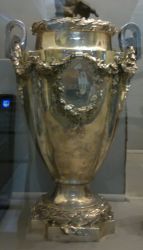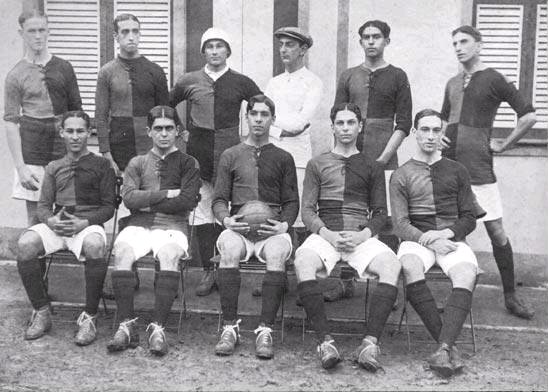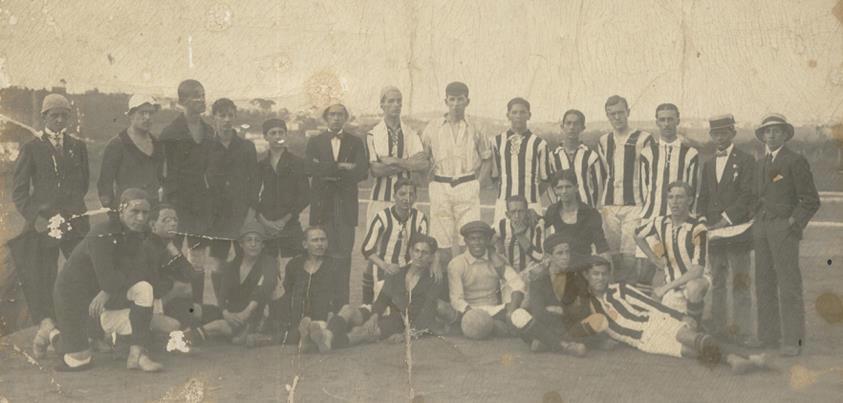|
1967 Campeonato Brasileiro Série A (Torneio Roberto Gomes Pedrosa)
The 1967 Campeonato Brasileiro Série A (officially the 1967 Torneio Roberto Gomes Pedrosa) was the 9th edition of the Campeonato Brasileiro Série A. It began on March 5 and ended on June 8. Palmeiras won the championship, the 2nd national title of the club in 8 years of tournament contention. This 1st edition of the tournament was organized by Federação de Futebol do Estado do Rio de Janeiro and Federação Paulista de Futebol. Championship format *First-phase: the 15 participants play all against all twice, but divided into two groups (one 7 and one 8) for classification, in the Group B, each team plays two more matches against any other. The first 2 of each group are classified for the finals. *Final-phase: the four clubs classified play all against all twice. The club with most points at this stage is the champion. *Tie-breaking criteria: 1 - Goal difference2 - Raffle *With one victory, a team still gained 2 points, instead of 3. First phase Group A Group B Final phas ... [...More Info...] [...Related Items...] OR: [Wikipedia] [Google] [Baidu] |
Campeonato Brasileiro Série A
The Campeonato Brasileiro Série A (; English: "Brazilian Championship A Series"), commonly referred to as the Brasileirão (; English: "Big Brazilian"), and also known as Brasileirão Assaí due to sponsorship with Assaí Atacadista, is a Brazilian professional league for men's football clubs. At the top of the Brazilian football league system, it is the country's primary football competition. Contested by 20 clubs, it operates on a system of promotion and relegation with the Campeonato Brasileiro Série B. In 2021 the competition was chosen by the IFFHS as the strongest national league in South America as well as the strongest in the world. Due to historical peculiarities and the large geographical size of the country, Brazil has a relatively short history of nationwide football competitions. Only in 1959, with the advancements in civil aviation and air transport and the need to appoint a Brazilian representative to the first edition of the Copa Libertadores was a nationw ... [...More Info...] [...Related Items...] OR: [Wikipedia] [Google] [Baidu] |
Grêmio Foot-Ball Porto Alegrense
Grêmio Foot-Ball Porto Alegrense (), commonly known as Grêmio, is a Brazilian professional football club based in Porto Alegre, capital city of the Brazilian state of Rio Grande do Sul. The club plays in the Campeonato Brasileiro Série A, the first division of the Brazilian football league system, and the Campeonato Gaúcho, Rio Grande do Sul's top state league. The club was founded in 1903 by European immigrants Englishman Andy Fairbank and German Paul Cochlin. The club's home ground is the Arena do Grêmio, to which it moved in 2013, having previously played at Estádio Olímpico Monumental since 1954. Grêmio also became Champions of the Intercontinental Cup, after beating Hamburger SV in 1983 (2–1). Also, Grêmio is the Brazilian club that has won the most Copa CONMEBOL Libertadores de América (3) titles alongside São Paulo, Santos, Palmeiras, and Flamengo. As of 2017, Grêmio was ranked number one in the CBF club rankings and is listed by ''Forbes'' as the ... [...More Info...] [...Related Items...] OR: [Wikipedia] [Google] [Baidu] |
Torneio Roberto Gomes Pedrosa
The Torneio Roberto Gomes Pedrosa, also known as Taça de Prata, or nicknamed Robertão, was an association football competition contested in Brazil between 1967 and 1970 among soccer teams from São Paulo, Rio de Janeiro, Rio Grande do Sul, Minas Gerais and Paraná states. It was an important soccer tournament, being considered a predecessor to the Brazilian Championship induced in 1971. Thus in 2010 the Brazilian Football Confederation decided to consider the winners of the Robertão as Brazilian champions. The 1st edition of the tournament was organized by Federação de Futebol do Estado do Rio de Janeiro and Federação Paulista de Futebol. History ''Torneio Roberto Gomes Pedrosa'', nicknamed ''Robertão'', was created in 1967 from the Torneio Rio-São Paulo, a traditional football competition contested by the major clubs from São Paulo and Rio de Janeiro, considered the strongest state federations. Since 1967, Torneio Rio-São Paulo had not been held until the revival i ... [...More Info...] [...Related Items...] OR: [Wikipedia] [Google] [Baidu] |
RSSSF
The Rec.Sport.Soccer Statistics Foundation (RSSSF) is an international organization dedicated to collecting statistics about association football. The foundation aims to build an exhaustive archive of football-related information from around the world. History This enterprise, according to its founders, was created in January 1994 by three regulars of the Rec.Sport.Soccer (RSS) Usenet newsgroup: Lars Aarhus, Kent Hedlundh, and Karel Stokkermans. It was originally known as the "North European Rec.Sport.Soccer Statistics Foundation", but the geographical reference was dropped as its membership from other regions grew. The RSSSF has members and contributors from all around the world and has spawned seven spin-off projects to more closely follow the leagues of that project's home country. The spin-off projects are dedicated to Albania, Brazil, Denmark, Norway, Poland (90minut.pl), Romania, Uruguay, Venezuela, and Egypt Egypt ( ar, مصر , ), officially the Arab Republic of ... [...More Info...] [...Related Items...] OR: [Wikipedia] [Google] [Baidu] |
Estádio Palestra Itália
The Palestra Itália Stadium ( pt, Estádio Palestra Itália), was a football stadium located in Barra Funda, São Paulo, standing on the site now occupied by the Allianz Parque stadium. It was the home ground of Sociedade Esportiva Palmeiras from 1917 to 2010, and was also known as Parque Antártica after Companhia Antarctica de Bebidas, a beverages company from which Palmeiras acquired the property in 1920. In the past its capacity was listed as 35,000 spectators, however, even though its grandstands have been extended in the late 1990s, the stadium had 27,650 seats due to regulations enforcing improved safety and comfort, before was demolished in November 2010. It was one of the most important Brazilian stadiums, considering the amount of decisive and important matches played there, most of them with the presence of Palmeiras. Examples of games played in Palestra Itália include the second leg of the 1999 Copa Libertadores Finals, the Copa Mercosur finals of 1998, 1999 and ... [...More Info...] [...Related Items...] OR: [Wikipedia] [Google] [Baidu] |
Porto Alegre
Porto Alegre (, , Brazilian ; ) is the capital and largest city of the Brazilian state of Rio Grande do Sul. Its population of 1,488,252 inhabitants (2020) makes it the List of largest cities in Brazil, twelfth most populous city in the country and the center of Brazil's List of metropolitan areas in Brazil, fifth largest metropolitan area, with 4,405,760 inhabitants (2010). The city is the southernmost capital city of a Brazilian state. Porto Alegre was founded in 1769 by Manuel Jorge Gomes de Sepúlveda, who used the pseudonym José Marcelino de Figueiredo to hide his identity; but the official date is 1772 with the act signed by Immigration to Brazil, immigrants from the Azores, Portugal. The city lies on the eastern bank of the Guaíba Lake, where five rivers converge to form the Lagoa dos Patos, a giant freshwater lagoon navigable by even the largest of ships. This five-river junction has become an important alluvial port as well as a chief industrial and commercial center ... [...More Info...] [...Related Items...] OR: [Wikipedia] [Google] [Baidu] |
Estádio Olímpico Monumental
Estádio Olímpico Monumental (''Monumental Olympic Stadium'', in English), also known as Estádio Olímpico de Porto Alegre (''Porto Alegre Olympic Stadium'') and Estádio Olímpico (''Olympic Stadium'') until 1980, is a football stadium in the city of Porto Alegre, in the Brazilian state of Rio Grande do Sul, with a maximum capacity of 45,000 people. The stadium is owned by Grêmio Foot-Ball Porto Alegrense. Inaugurated on September 19, 1954, the stadium was the home field of the Grêmio football club before being the team moved to Arena do Grêmio in December 2012. Currently, the venue is not in use by the club and suffers from lack of maintenance. History The stadium was inaugurated on September 19, 1954, with a maximum capacity of 38,000 people. In 1980, the stadium was expanded, and its capacity increased to 85,000 people. In 1990, the upper ring bleachers were numbered, and the Olímpico Monumental's capacity decreased to 51,081 people. The inaugural match was played on ... [...More Info...] [...Related Items...] OR: [Wikipedia] [Google] [Baidu] |
São Paulo
São Paulo (, ; Portuguese for 'Saint Paul') is the most populous city in Brazil, and is the capital of the state of São Paulo, the most populous and wealthiest Brazilian state, located in the country's Southeast Region. Listed by the GaWC as an alpha global city, São Paulo is the most populous city proper in the Americas, the Western Hemisphere and the Southern Hemisphere, as well as the world's 4th largest city proper by population. Additionally, São Paulo is the largest Portuguese-speaking city in the world. It exerts strong international influences in commerce, finance, arts and entertainment. The city's name honors the Apostle, Saint Paul of Tarsus. The city's metropolitan area, the Greater São Paulo, ranks as the most populous in Brazil and the 12th most populous on Earth. The process of conurbation between the metropolitan areas around the Greater São Paulo (Campinas, Santos, Jundiaí, Sorocaba and São José dos Campos) created the São Paulo Macrometr ... [...More Info...] [...Related Items...] OR: [Wikipedia] [Google] [Baidu] |
Estádio Do Pacaembu
Estádio Municipal Paulo Machado de Carvalho, colloquially known as Estádio do Pacaembu (), is an Art Deco stadium in São Paulo, located in the Pacaembu neighborhood. The stadium is owned by the Municipal Prefecture of São Paulo. The stadium was inaugurated on 27 April 1940, in the presence of the Brazilian President Getúlio Vargas, the interventor Adhemar de Barros and the mayor of São Paulo, Prestes Maia. The stadium holds 40,199 people and its pitch dimensions are 104 m of length by 70 m of width. The stadium is named after Paulo Machado de Carvalho. He was the 1958 FIFA World Cup Brazilian delegation chief, the founder of Rede Record, one of the largest television networks in Brazil and was known as "''Marechal da Vitória''" (''Marshal of Victory''). Pacaembu is frequently used to host home matches of the ''Big 4'' football clubs of the State of São Paulo, of which Corinthians, Palmeiras and São Paulo are based in the capital city itself, and only Santos is based i ... [...More Info...] [...Related Items...] OR: [Wikipedia] [Google] [Baidu] |
Clube Atlético Ferroviário
Clube Atlético Ferroviário, commonly known as Ferroviário, were a Brazilian football team from Curitiba, Paraná state. They won the Campeonato Paranaense eight times. History Clube Atlético Ferroviário were founded on January 12, 1930. They won the Campeonato Paranaense in 1937, 1938, 1944, 1948, 1950, 1953, 1965, and in 1966. The club fused with Britânia Sport Club and Palestra Itália Futebol Clube in 1971, forming Colorado Esporte Clube. Subsequently, it joined Esporte Clube Pinheiros (PR), forming Paraná Clube. Stadium Clube Atlético Ferroviário played their home games at Estádio Durival Britto. The stadium has a maximum capacity of 20,000 people. Achievements * Campeonato Paranaense Campeonato Paranaense, which has been contested since 1915, is the top-flight football league of the state of Paraná, Brazil. Format The format has changed in 2014. 12 teams are together in a single group. They play against each other once, ...: ** Winners (8): 1937, 1938, 19 ... [...More Info...] [...Related Items...] OR: [Wikipedia] [Google] [Baidu] |
Clube De Regatas Do Flamengo
Clube de Regatas do Flamengo (; English: ''Flamengo Rowing Club''), more commonly referred to as simply Flamengo, is a Brazilian sports club based in Rio de Janeiro, in the neighborhood of Gávea, best known for their professional football team that plays in Campeonato Brasileiro Série A, as well as Campeonato Carioca. The club was first established in 1895 specifically as a rowing club and did not play their first official football match until 1912. Flamengo's traditional uniform features red and black striped shirts with white shorts, and red and black striped socks. Flamengo has typically played their home matches in the Maracanã, the national stadium of Brazil, since its completion in 1950, with some exceptions in recent years. Since 1969, the vulture (Portuguese: ''urubu'') has been the most recognized mascot of Flamengo. Flamengo established themselves as one of Brazil's most successful sports clubs in the 20th century during the era of state leagues in Brazil w ... [...More Info...] [...Related Items...] OR: [Wikipedia] [Google] [Baidu] |
Clube Atlético Mineiro
Clube Atlético Mineiro (), commonly known as Atlético Mineiro or Atlético, and colloquially as Galo (, "Rooster"), is the largest professional football club based in the city of Belo Horizonte, the capital city of the Brazilian state of Minas Gerais. The team competes in the Campeonato Brasileiro Série A, the first level of Brazilian football, as well as in the Campeonato Mineiro, the top tier state league of Minas Gerais. Atlético Mineiro is the oldest active football club in Minas Gerais, founded on 25 March 1908 by twenty-two students from Belo Horizonte. Despite having upper-class founders, the club immediately opened its doors to players of every social class, establishing itself as a "people's club", and becoming one of the most-supported clubs in Brazil. The club's mascot, a rooster, has been strongly associated with Atlético since its introduction in the 1930s. Over the years, the word ''Galo'' (Portuguese for "rooster") became a common nickname for the club it ... [...More Info...] [...Related Items...] OR: [Wikipedia] [Google] [Baidu] |





